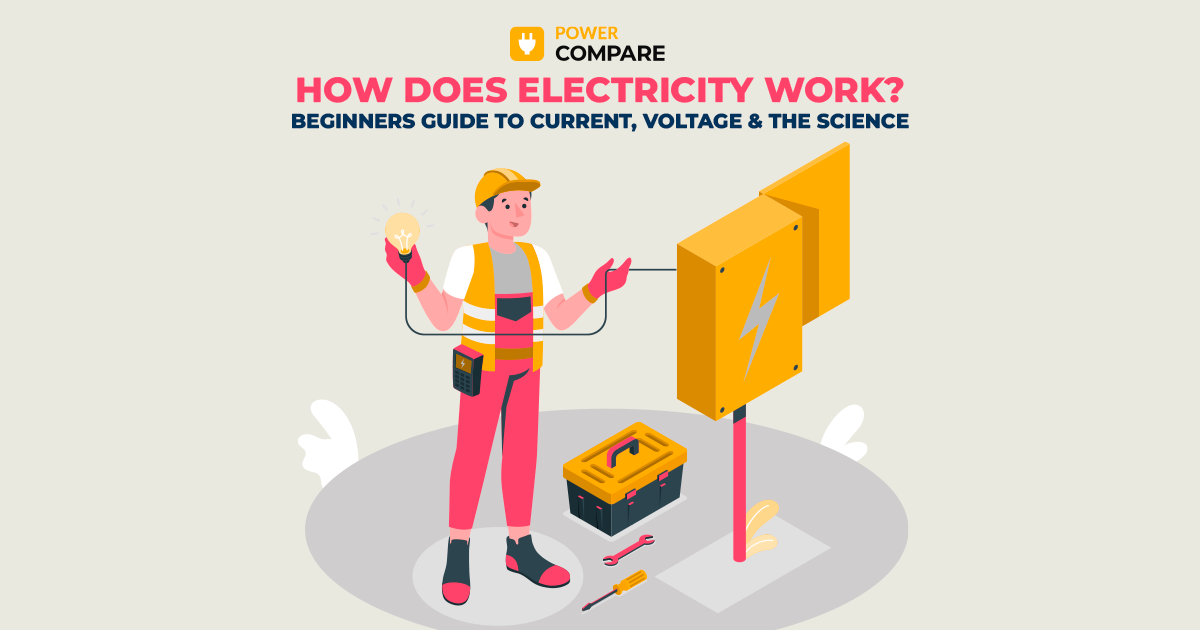How does Electricity Work? Beginners Guide to Current, Voltage and the Science

Electricity powers our lives and keeps us moving. It fuels our home, phones, tvs, computers, lights, and for some, it even powers our vehicles.
But what really is electricity? How does it work? Let’s explore the science behind this everyday resource.
What is electricity?
In simple terms, electricity is the flow of charged particles. The science behind electricity comes down to the atoms. Atoms are small particles that form all the matter in the world and our universe. On an even smaller scale, atoms are made up of protons, neutrons and electrons. Electricity is simply the event of charged electrons flowing from one place to another. In simpler terms, this looks like tiny microscopic particles moving from one place to another.
In New Zealand, and the wider world, we can generate electricity by several methods such as non-renewable energy sources including burning fossil fuels, and renewable sources such as hydro or water, solar, geothermal and wind.
History of Power and Different Types of Power
What is the current?
To make electrons move, and to make electricity move from one place to another, we must make an electric circuit. An electric circuit is made up of a power supply, conductor, load, and switch. The circuit must be complete and closed for the electricity to flow through it. So, when you turn your light switch on, you are closing the circuit, and allowing the electricity to flow through and power your light bulb! This process is the current.
What is voltage?
The voltage is the pressure that pushes electricity through the current. We can see the amount of voltage in a circuit or current by checking the unit known as the volt (V). When the voltage is higher, it means that more electricity is flowing into your device. Our devices are designed to take a certain amount of voltage. Different places in the world operate on different voltages. If you travel overseas with your hairdryer, you may risk damaging your device by plugging it into an overseas outlet, as the voltage running through may be higher.
What is conductivity?
Conductivity is the material that allows electrons to flow easier. Metals such as copper, silver and even gold are great conductors of electricity, allowing it to flow fast. Materials that prevent the flow of electricity are called insulators and they prevent the flow of electricity.
Safety tip: Water is a conductor of electricity, which means it can pose a safety hazard in the household. Keep appliances and electric tools away from the bathroom, kitchen and laundry sink.
Read More About Electrical Safety
Now you know how power works in and around your home, it’s time to reduce the money you spend on it.
Tips for Saving Power in the Home
Power Compare is an easy-to-use tool that allows you to compare different power providers and plans side-by-side. With Power Compare you can take power over your bills, and find a better deal that will lower your bill and save you money. How shocking? Simply jump on Power Compare, type in your address, and select filters based on your preferences, and compare the different plans. Find a better deal? Simply make the switch through Power Compare.
Or, if you’d prefer to speak to a human, you can call our friendly Auckland-based team for free. They offer bias-free, obligation-free advice on power for free. Go on, save that money!
Call on 0508 226672
Further reading:

